Top 100 Works in World Literature by Norwegian Book Clubs, with the Norwegian Nobel Institute
The editors of the Norwegian Book Clubs, with the Norwegian Nobel Institute, polled a panel of 100 authors from 54 countries on what they considered the “best and most central works in world literature.” Among the authors polled were Milan Kundera, Doris Lessing, Seamus Heaney, Salman Rushdie, Wole Soyinka, John Irving, Nadine Gordimer, and Carlos Fuentes. The list of 100 works appears alphabetically by author. Although the books were not ranked, the editors revealed that Don Quixote received 50% more votes than any other book.-
1. Don Quixote by Miguel de Cervantes
 Alonso Quixano, a retired country gentleman in his fifties, lives in an unnamed section of La Mancha with his niece and a housekeeper. He has become obsessed with books of chivalry, and believes th...
Alonso Quixano, a retired country gentleman in his fifties, lives in an unnamed section of La Mancha with his niece and a housekeeper. He has become obsessed with books of chivalry, and believes th...
-
The Book of Job by Israel
 The Book of Job is one of the books of the Hebrew Bible. It relates the story of Job, his trials at the hands of Satan, his theological discussions with friends on the origins and nature of his suf...
The Book of Job is one of the books of the Hebrew Bible. It relates the story of Job, his trials at the hands of Satan, his theological discussions with friends on the origins and nature of his suf...
-
The Odyssey by Homer
 The Odyssey is one of two major ancient Greek epic poems attributed to Homer. It is, in part, a sequel to the Iliad, the other work traditionally ascribed to Homer. The poem is fundamental to the m...
The Odyssey is one of two major ancient Greek epic poems attributed to Homer. It is, in part, a sequel to the Iliad, the other work traditionally ascribed to Homer. The poem is fundamental to the m...
-
The Iliad by Homer
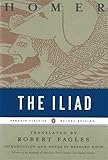 The Iliad is an epic poem in dactylic hexameters, traditionally attributed to Homer. Set in the Trojan War, the ten-year siege of Ilium by a coalition of Greek states, it tells of the battles and e...
The Iliad is an epic poem in dactylic hexameters, traditionally attributed to Homer. Set in the Trojan War, the ten-year siege of Ilium by a coalition of Greek states, it tells of the battles and e...
-
Epic of Gilgamesh by Unknown
 The Epic of Gilgamesh is an epic poem from Ancient Iraq and is among the earliest known works of literary writings. Scholars believe that it originated as a series of Sumerian legends and poems abo...
The Epic of Gilgamesh is an epic poem from Ancient Iraq and is among the earliest known works of literary writings. Scholars believe that it originated as a series of Sumerian legends and poems abo...
-
Ramayana by Valmiki
 The Ramayana is an ancient Sanskrit epic. It is attributed to the Hindu sage Valmiki and forms an important part of the Hindu canon (smṛti). The Ramayana is one of the two great epics of India, the...
The Ramayana is an ancient Sanskrit epic. It is attributed to the Hindu sage Valmiki and forms an important part of the Hindu canon (smṛti). The Ramayana is one of the two great epics of India, the...
-
Medea by Euripides
 Medea is an ancient Greek tragedy written by Euripides, based upon the myth of Jason and Medea and first produced in 431 BC. The plot centers on the barbarian protagonist as she finds her position ...
Medea is an ancient Greek tragedy written by Euripides, based upon the myth of Jason and Medea and first produced in 431 BC. The plot centers on the barbarian protagonist as she finds her position ...
-
Oedipus the King by Sophocles
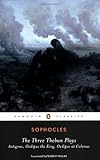 Oedipus the King is an Athenian tragedy by Sophocles that was first performed c. 429 BC. It was the second of Sophocles's three Theban plays to be produced, but it comes first in the internal chron...
Oedipus the King is an Athenian tragedy by Sophocles that was first performed c. 429 BC. It was the second of Sophocles's three Theban plays to be produced, but it comes first in the internal chron...
-
The Recognition of Sakuntala by Kalidasa
 The Recognition of Sakuntala is a well-known Sanskrit play by Kālidāsa. Its date is uncertain, but Kalidasa is often placed in the period between the 1st century BC and 4th century AD. The Sansk...
The Recognition of Sakuntala is a well-known Sanskrit play by Kālidāsa. Its date is uncertain, but Kalidasa is often placed in the period between the 1st century BC and 4th century AD. The Sansk...
-
The Aeneid by Virgil
 The Aeneid is a Latin epic poem written by Virgil in the late 1st century BC (29–19 BC) that tells the legendary story of Aeneas, a Trojan who traveled to Italy, where he became the ancestor of the...
The Aeneid is a Latin epic poem written by Virgil in the late 1st century BC (29–19 BC) that tells the legendary story of Aeneas, a Trojan who traveled to Italy, where he became the ancestor of the...
-
Metamorphoses by Ovid
 The Metamorphoses by the Roman poet Ovid is a narrative poem in fifteen books that describes the creation and history of the world. Completed in 8 AD, it has remained one of the most popular works ...
The Metamorphoses by the Roman poet Ovid is a narrative poem in fifteen books that describes the creation and history of the world. Completed in 8 AD, it has remained one of the most popular works ...
-
Mahabharata by Vyasa
 The Mahabharata is one of the two major Sanskrit epics of ancient India, the other being the Rāmāyaṇa. The epic is part of the Hindu itihāsa (literally "history"), and forms an important part of Hi...
The Mahabharata is one of the two major Sanskrit epics of ancient India, the other being the Rāmāyaṇa. The epic is part of the Hindu itihāsa (literally "history"), and forms an important part of Hi...
-
The Tale of Genji by Murasaki Shikibu
 The Tale of Genji is a classic work of Japanese literature attributed to the Japanese noblewoman Murasaki Shikibu in the early eleventh century, around the peak of the Heian Period. It is sometimes...
The Tale of Genji is a classic work of Japanese literature attributed to the Japanese noblewoman Murasaki Shikibu in the early eleventh century, around the peak of the Heian Period. It is sometimes...
-
Children of Gebelawi by Naguib Mahfouz
 Children of Gebelawi, is a novel by the Egyptian writer and Nobel laureate Naguib Mahfouz. It is also known by its Egyptian dialectal transliteration, Awlad Haretna, formal Arabic transliteration, ...
Children of Gebelawi, is a novel by the Egyptian writer and Nobel laureate Naguib Mahfouz. It is also known by its Egyptian dialectal transliteration, Awlad Haretna, formal Arabic transliteration, ...
-
Njal's Saga by Iceland
 Njáls saga is arguably the most famous of the Sagas of Icelanders. Among Icelanders, the saga is most often referred to simply as Njála. This Icelandic epic from the 13th century describes the p...
Njáls saga is arguably the most famous of the Sagas of Icelanders. Among Icelanders, the saga is most often referred to simply as Njála. This Icelandic epic from the 13th century describes the p...
-
Masnavi by Jalal al-Din Muhammad Rumi
 The Masnavi or Masnavi-I Ma'navi, also written Mathnawi or Mesnevi, written in Persian by Jalal al-Din Muhammad Rumi, the celebrated Persian Sufi saint and poet, is one of the best known and most i...
The Masnavi or Masnavi-I Ma'navi, also written Mathnawi or Mesnevi, written in Persian by Jalal al-Din Muhammad Rumi, the celebrated Persian Sufi saint and poet, is one of the best known and most i...
-
Bostan by Saadi
 Bostan (pronounced "Bustān") is a book of poetry by the Persian poet Saadi, completed in 1257. It was Saadi's first work, and its title means "the fruit orchard". The book contains the fruits of S...
Bostan (pronounced "Bustān") is a book of poetry by the Persian poet Saadi, completed in 1257. It was Saadi's first work, and its title means "the fruit orchard". The book contains the fruits of S...
-
Decameron by Giovanni Boccaccio
 In the early summer of the year 1348, as a terrible plague ravages the city, ten charming young Florentines take refuge in country villas to tell each other stories — a hundred stories of love, adv...
In the early summer of the year 1348, as a terrible plague ravages the city, ten charming young Florentines take refuge in country villas to tell each other stories — a hundred stories of love, adv...
-
The Canterbury Tales by Geoffrey Chaucer
 With their astonishing diversity of tone and subject matter, The Canterbury Tales have become one of the touchstones of medieval literature. Translated here into modern English, these tales of a mo...
With their astonishing diversity of tone and subject matter, The Canterbury Tales have become one of the touchstones of medieval literature. Translated here into modern English, these tales of a mo...
-
The Divine Comedy by Dante Alighieri
 Belonging in the immortal company of the great works of literature, Dante Alighieri's poetic masterpiece, The Divine Comedy, is a moving human drama, an unforgettable visionary journey through the ...
Belonging in the immortal company of the great works of literature, Dante Alighieri's poetic masterpiece, The Divine Comedy, is a moving human drama, an unforgettable visionary journey through the ...
-
Gargantua and Pantagruel by Francois Rabelais
 The Life of Gargantua and of Pantagruel (in French, La vie de Gargantua et de Pantagruel) is a connected series of five novels written in the 16th century by François Rabelais. It is the story of t...
The Life of Gargantua and of Pantagruel (in French, La vie de Gargantua et de Pantagruel) is a connected series of five novels written in the 16th century by François Rabelais. It is the story of t...
-
Essays by Michel de Montaigne
 Essays is the title given to a collection of 107 essays written by Michel de Montaigne that was first published in 1580. Montaigne essentially invented the literary form of essay, a short subjectiv...
Essays is the title given to a collection of 107 essays written by Michel de Montaigne that was first published in 1580. Montaigne essentially invented the literary form of essay, a short subjectiv...
-
Hamlet by William Shakespeare
 The Tragedy of Hamlet, Prince of Denmark, or more simply Hamlet, is a tragedy by William Shakespeare, believed to have been written between 1599 and 1601. The play, set in Denmark, recounts how Pri...
The Tragedy of Hamlet, Prince of Denmark, or more simply Hamlet, is a tragedy by William Shakespeare, believed to have been written between 1599 and 1601. The play, set in Denmark, recounts how Pri...
-
Othello by William Shakespeare
 Othello, the Moor of Venice is a tragedy by William Shakespeare, believed to have been written in approximately 1603, and based on the Italian short story "Un Capitano Moro" ("A Moorish Captain") b...
Othello, the Moor of Venice is a tragedy by William Shakespeare, believed to have been written in approximately 1603, and based on the Italian short story "Un Capitano Moro" ("A Moorish Captain") b...
-
King Lear by William Shakespeare
 King Lear is a tragedy by William Shakespeare, believed to have been written between 1603 and 1606. It is considered one of his greatest works. The play is based on the legend of Leir of Britain, a...
King Lear is a tragedy by William Shakespeare, believed to have been written between 1603 and 1606. It is considered one of his greatest works. The play is based on the legend of Leir of Britain, a...
-
One Thousand and One Nights by India/Iran/Iraq/Egypt
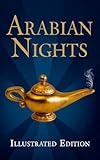 One Thousand and One Nights is a collection of Middle Eastern and South Asian stories and folk tales compiled in Arabic during the Islamic Golden Age. It is often known in English as the Arabian Ni...
One Thousand and One Nights is a collection of Middle Eastern and South Asian stories and folk tales compiled in Arabic during the Islamic Golden Age. It is often known in English as the Arabian Ni...
-
Gulliver's Travels by Jonathan Swift
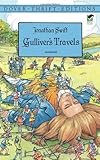 From the preeminent prose satirist in the English language, a great classic recounting the four remarkable journeys of ship's surgeon Lemuel Gulliver. For children it remains an enchanting fantasy;...
From the preeminent prose satirist in the English language, a great classic recounting the four remarkable journeys of ship's surgeon Lemuel Gulliver. For children it remains an enchanting fantasy;...
-
Tristram Shandy by Laurence Sterne
 As its title suggests, the book is ostensibly Tristram's narration of his life story. But it is one of the central jokes of the novel that he cannot explain anything simply, that he must make expla...
As its title suggests, the book is ostensibly Tristram's narration of his life story. But it is one of the central jokes of the novel that he cannot explain anything simply, that he must make expla...
-
Jacques the Fatalist and His Master by Denis Diderot
 The main subject of the book is the relationship between the valet Jacques and his master (who is never named). The two are traveling to a destination the narrator leaves insistently vague, and to ...
The main subject of the book is the relationship between the valet Jacques and his master (who is never named). The two are traveling to a destination the narrator leaves insistently vague, and to ...
-
Faust by Johann Wolfgang von Goethe
 Johann Wolfgang von Goethe's Faust is a tragic play, although more appropriately it should be defined a tragicomedy, despite the very title of the work. It was published in two parts: Faust. Der Tr...
Johann Wolfgang von Goethe's Faust is a tragic play, although more appropriately it should be defined a tragicomedy, despite the very title of the work. It was published in two parts: Faust. Der Tr...
-
Pride and Prejudice by Jane Austen
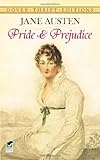 The book is narrated in free indirect speech following the main character Elizabeth Bennet as she deals with matters of upbringing, marriage, moral rightness and education in her aristocratic socie...
The book is narrated in free indirect speech following the main character Elizabeth Bennet as she deals with matters of upbringing, marriage, moral rightness and education in her aristocratic socie...
-
The Red and the Black by Stendhal
 Le Rouge et le Noir (The Red and the Black), subtitled Chronique du XIXe siécle ("Chronicle of the 19th century"), is an historical psychological novel in two volumes by Stendhal, published in 1830...
Le Rouge et le Noir (The Red and the Black), subtitled Chronique du XIXe siécle ("Chronicle of the 19th century"), is an historical psychological novel in two volumes by Stendhal, published in 1830...
-
Father Goriot by Honoré de Balzac
 Le Père Goriot (English: Father Goriot or Old Goriot) is an 1835 novel by French novelist and playwright Honoré de Balzac (1799–1850), included in the Scènes de la vie privée section of his novel s...
Le Père Goriot (English: Father Goriot or Old Goriot) is an 1835 novel by French novelist and playwright Honoré de Balzac (1799–1850), included in the Scènes de la vie privée section of his novel s...
-
Dead Souls by Nikolai Gogol
 Dead Souls by Nikolai Gogol, Russian writer, was first published in 1842, and is one of the most prominent works of 19th-century Russian literature. Gogol himself saw it as an "epic poem in prose",...
Dead Souls by Nikolai Gogol, Russian writer, was first published in 1842, and is one of the most prominent works of 19th-century Russian literature. Gogol himself saw it as an "epic poem in prose",...
-
Fairy Tales and Stories by Hans Christian Anderson
 a Danish author and poet noted for his children's stories. These include "The Steadfast Tin Soldier", "The Snow Queen", "The Little Mermaid", "Thumbelina", "The Little Match Girl", and the "The Ugl...
a Danish author and poet noted for his children's stories. These include "The Steadfast Tin Soldier", "The Snow Queen", "The Little Mermaid", "Thumbelina", "The Little Match Girl", and the "The Ugl...
-
Wuthering Heights by Emily Brontë
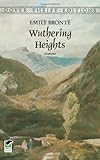 The narrative is non-linear, involving several flashbacks, and two primary narrators: Mr. Lockwood and Ellen "Nelly" Dean. The novel opens in 1801, with Mr. Lockwood arriving at Thrushcross Grange,...
The narrative is non-linear, involving several flashbacks, and two primary narrators: Mr. Lockwood and Ellen "Nelly" Dean. The novel opens in 1801, with Mr. Lockwood arriving at Thrushcross Grange,...
-
Moby Dick by Herman Melville
 First published in 1851, Melville's masterpiece is, in Elizabeth Hardwick's words, "the greatest novel in American literature." The saga of Captain Ahab and his monomaniacal pursuit of the white wh...
First published in 1851, Melville's masterpiece is, in Elizabeth Hardwick's words, "the greatest novel in American literature." The saga of Captain Ahab and his monomaniacal pursuit of the white wh...
-
Leaves of Grass by Walt Whitman
 Leaves of Grass (1855) is a poetry collection by the American poet Walt Whitman. Among the poems in the collection are "Song of Myself," "I Sing the Body Electric," "Out of the Cradle Endlessly Roc...
Leaves of Grass (1855) is a poetry collection by the American poet Walt Whitman. Among the poems in the collection are "Song of Myself," "I Sing the Body Electric," "Out of the Cradle Endlessly Roc...
-
Madame Bovary by Gustave Flaubert
 For daring to peer into the heart of an adulteress and enumerate its contents with profound dispassion, the author of Madame Bovary was tried for "offenses against morality and religion." What shoc...
For daring to peer into the heart of an adulteress and enumerate its contents with profound dispassion, the author of Madame Bovary was tried for "offenses against morality and religion." What shoc...
-
Great Expectations by Charles Dickens
 Great Expectations is written in the genre of "bildungsroman" or the style of book that follows the story of a man or woman in their quest for maturity, usually starting from childhood and ending i...
Great Expectations is written in the genre of "bildungsroman" or the style of book that follows the story of a man or woman in their quest for maturity, usually starting from childhood and ending i...
-
Crime and Punishment by Fyodor Dostoyevsky
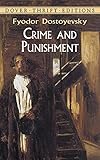 It is a murder story, told from a murder;s point of view, that implicates even the most innocent reader in its enormities. It is a cat-and-mouse game between a tormented young killer and a cheerful...
It is a murder story, told from a murder;s point of view, that implicates even the most innocent reader in its enormities. It is a cat-and-mouse game between a tormented young killer and a cheerful...
-
The Idiot by Fyodor Dostoyevsky
 The Idiot is a novel written by the Russian author Fyodor Dostoyevsky and first published in 1868. It was first published serially in Russian in Russky Vestnik, St. Petersburg, 1868-1869. The Idiot...
The Idiot is a novel written by the Russian author Fyodor Dostoyevsky and first published in 1868. It was first published serially in Russian in Russky Vestnik, St. Petersburg, 1868-1869. The Idiot...
-
War and Peace by Leo Tolstoy
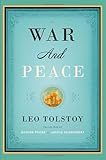 Epic in scale, War and Peace delineates in graphic detail events leading up to Napoleon's invasion of Russia, and the impact of the Napoleonic era on Tsarist society, as seen through the eyes of fi...
Epic in scale, War and Peace delineates in graphic detail events leading up to Napoleon's invasion of Russia, and the impact of the Napoleonic era on Tsarist society, as seen through the eyes of fi...
-
A Sentimental Education by Gustave Flaubert
 The novel describes the life of a young man (Frederic Moreau) living through the revolution of 1848 and the founding of the Second French Empire, and his love for an older woman (based on the wife ...
The novel describes the life of a young man (Frederic Moreau) living through the revolution of 1848 and the founding of the Second French Empire, and his love for an older woman (based on the wife ...
-
Middlemarch by George Eliot
 Middlemarch: A Study of Provincial Life is a novel by George Eliot, the pen name of Mary Anne Evans, later Marian Evans. It is her seventh novel, begun in 1869 and then put aside during the final i...
Middlemarch: A Study of Provincial Life is a novel by George Eliot, the pen name of Mary Anne Evans, later Marian Evans. It is her seventh novel, begun in 1869 and then put aside during the final i...
-
The Possessed by Fyodor Dostoevsky
 The Possessed is an 1872 novel by Fyodor Dostoevsky. Though titled The Possessed in the initial English translation, Dostoevsky scholars and later translations favour the titles The Devils or Demon...
The Possessed is an 1872 novel by Fyodor Dostoevsky. Though titled The Possessed in the initial English translation, Dostoevsky scholars and later translations favour the titles The Devils or Demon...
-
Anna Karenina by Leo Tolstoy
 Anna Karenina tells of the doomed love affair between the sensuous and rebellious Anna and the dashing officer, Count Vronsky. Tragedy unfolds as Anna rejects her passionless marriage and must endu...
Anna Karenina tells of the doomed love affair between the sensuous and rebellious Anna and the dashing officer, Count Vronsky. Tragedy unfolds as Anna rejects her passionless marriage and must endu...
-
A Doll's House by Henrik Ibsen
 A Doll's House is an 1879 play by Norwegian playwright Henrik Ibsen. Written one year after The Pillars of Society, the play was the first of Ibsen's to create a sensation and is now perhaps his mo...
A Doll's House is an 1879 play by Norwegian playwright Henrik Ibsen. Written one year after The Pillars of Society, the play was the first of Ibsen's to create a sensation and is now perhaps his mo...
-
The Brothers Karamazov by Fyodor Dostoyevsky
 Dostoevsky's last and greatest novel, The Karamazov Brothers, is both a brilliantly told crime story and a passionate philosophical debate. The dissolute landowner Fyodor Pavlovich Karamazov is mur...
Dostoevsky's last and greatest novel, The Karamazov Brothers, is both a brilliantly told crime story and a passionate philosophical debate. The dissolute landowner Fyodor Pavlovich Karamazov is mur...
-
The Adventures of Huckleberry Finn by Mark Twain
 Revered by all of the town's children and dreaded by all of its mothers, Huckleberry Finn is indisputably the most appealing child-hero in American literature. Unlike the tall-tale, idyllic worl...
Revered by all of the town's children and dreaded by all of its mothers, Huckleberry Finn is indisputably the most appealing child-hero in American literature. Unlike the tall-tale, idyllic worl...
-
The Death of Ivan Ilyich by Leo Tolstoy
 The Death of Ivan Ilyich, first published in 1886, is a novella by Leo Tolstoy, one of the masterpieces of his late fiction, written shortly after his conversion to Christianity. The novel tells...
The Death of Ivan Ilyich, first published in 1886, is a novella by Leo Tolstoy, one of the masterpieces of his late fiction, written shortly after his conversion to Christianity. The novel tells...
-
Hunger by Knut Hamsun
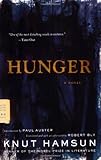 Hunger is a novel by the Norwegian author Knut Hamsun and was published in its final form in 1890. Parts of it had been published anonymously in the Danish magazine Ny Jord in 1888. The novel is ha...
Hunger is a novel by the Norwegian author Knut Hamsun and was published in its final form in 1890. Parts of it had been published anonymously in the Danish magazine Ny Jord in 1888. The novel is ha...
-
Buddenbrooks by Thomas Mann
 Buddenbrooks was Thomas Mann's first novel, published in 1901 when he was twenty-six years old. It portrays the downfall (already announced in the subtitle, Decline of a family) of a wealthy mer...
Buddenbrooks was Thomas Mann's first novel, published in 1901 when he was twenty-six years old. It portrays the downfall (already announced in the subtitle, Decline of a family) of a wealthy mer...
-
Nostromo by Joseph Conrad
 Edited with an introduction and notes by Martin Seymour-Smith. In his evocation of the republic of Costaguana, set amid the exotic and grandiose scenery of South America, Conrad reveals not only th...
Edited with an introduction and notes by Martin Seymour-Smith. In his evocation of the republic of Costaguana, set amid the exotic and grandiose scenery of South America, Conrad reveals not only th...
-
Sons and Lovers by D. H. Lawrence
 Sons and Lovers is one of the landmark novels of the twentieth century. When it appeared in 1913, it was immediately recognized as the first great modern restatement of the oedipal drama, and it is...
Sons and Lovers is one of the landmark novels of the twentieth century. When it appeared in 1913, it was immediately recognized as the first great modern restatement of the oedipal drama, and it is...
-
In Search of Lost Time by Marcel Proust
 Swann's Way, the first part of A la recherche de temps perdu, Marcel Proust's seven-part cycle, was published in 1913. In it, Proust introduces the themes that run through the entire work. The narr...
Swann's Way, the first part of A la recherche de temps perdu, Marcel Proust's seven-part cycle, was published in 1913. In it, Proust introduces the themes that run through the entire work. The narr...
-
Diary of a Madman and Other Stories by Xun Lu
 Xun (or Hsun) is the master (inventor?) of the modern Chinese short story. Some of his stories were translated into American English in 1941, but more recent translations have been into a British E...
Xun (or Hsun) is the master (inventor?) of the modern Chinese short story. Some of his stories were translated into American English in 1941, but more recent translations have been into a British E...
- Google
-
Ulysses by James Joyce
 Ulysses chronicles the passage of Leopold Bloom through Dublin during an ordinary day, June 16, 1904. The title parallels and alludes to Odysseus (Latinised into Ulysses), the hero of Homer's Odyss...
Ulysses chronicles the passage of Leopold Bloom through Dublin during an ordinary day, June 16, 1904. The title parallels and alludes to Odysseus (Latinised into Ulysses), the hero of Homer's Odyss...
-
Confessions of Zeno by Italo Svevo
 Zeno's Conscience is a novel by Italian businessman and author Italo Svevo. The main character is Zeno Cosini and the book is the fictional character's memoirs that he keeps at the insistence of hi...
Zeno's Conscience is a novel by Italian businessman and author Italo Svevo. The main character is Zeno Cosini and the book is the fictional character's memoirs that he keeps at the insistence of hi...
-
The Magic Mountain by Thomas Mann
 The Magic Mountain is a novel by Thomas Mann, first published in November 1924. It is widely considered to be one of the most influential works of 20th century German literature.
The Magic Mountain is a novel by Thomas Mann, first published in November 1924. It is widely considered to be one of the most influential works of 20th century German literature.
-
Mrs. Dalloway by Virginia Woolf
 Created from two short stories, "Mrs Dalloway in Bond Street" and the unfinished "The Prime Minister", the novel's story is of Clarissa's preparations for a party of which she is to be hostess. Wit...
Created from two short stories, "Mrs Dalloway in Bond Street" and the unfinished "The Prime Minister", the novel's story is of Clarissa's preparations for a party of which she is to be hostess. Wit...
-
The Trial by Franz Kafka
 Written in 1914, The Trial is one of the most important novels of the twentieth century: the terrifying tale of Josef K., a respectable bank officer who is suddenly and inexplicably arrested and mu...
Written in 1914, The Trial is one of the most important novels of the twentieth century: the terrifying tale of Josef K., a respectable bank officer who is suddenly and inexplicably arrested and mu...
-
The Castle by Franz Kafka
 The Castle is a novel by Franz Kafka. In it a protagonist, known only as K., struggles to gain access to the mysterious authorities of a castle who govern the village where he wants to work as a la...
The Castle is a novel by Franz Kafka. In it a protagonist, known only as K., struggles to gain access to the mysterious authorities of a castle who govern the village where he wants to work as a la...
-
To the Lighthouse by Virginia Woolf
 A landmark novel of high modernism, the text, centering on the Ramsay family and their visits to the Isle of Skye in Scotland between 1910 and 1920, skillfully manipulates temporality and psycholog...
A landmark novel of high modernism, the text, centering on the Ramsay family and their visits to the Isle of Skye in Scotland between 1910 and 1920, skillfully manipulates temporality and psycholog...
-
Gypsy Ballads by Federico Garcia Lorca
 The publication in 1928 of Romancero gitano (written 1921–27; Gypsy Ballads), a poetry sequence inspired by the traditional Spanish romance, or ballad, catapulted Lorca into the national spotlight.
The publication in 1928 of Romancero gitano (written 1921–27; Gypsy Ballads), a poetry sequence inspired by the traditional Spanish romance, or ballad, catapulted Lorca into the national spotlight.
-
The Sound and the Fury by William Faulkner
 The Sound and the Fury is set in the fictional Yoknapatawpha County. The novel centers on the Compson family, former Southern aristocrats who are struggling to deal with the dissolution of their fa...
The Sound and the Fury is set in the fictional Yoknapatawpha County. The novel centers on the Compson family, former Southern aristocrats who are struggling to deal with the dissolution of their fa...
-
Berlin Alexanderplatz by Alfred Döblin
 The story concerns a small-time criminal, Franz Biberkopf, fresh from prison, who is drawn into the underworld. When his criminal mentor murders the prostitute whom Biberkopf has been relying on as...
The story concerns a small-time criminal, Franz Biberkopf, fresh from prison, who is drawn into the underworld. When his criminal mentor murders the prostitute whom Biberkopf has been relying on as...
-
The Man Without Qualities by Robert Musil
 The Man without Qualities (1930-42) is a novel in three books by the Austrian novelist and essayist Robert Musil. The main issue of this "story of ideas", which takes place in the time of the Au...
The Man without Qualities (1930-42) is a novel in three books by the Austrian novelist and essayist Robert Musil. The main issue of this "story of ideas", which takes place in the time of the Au...
-
Journey to the End of The Night by Louis-Ferdinand Céline
 Journey to the End of Night is the first novel of Louis-Ferdinand Céline. This semi-autobiographical work describes antihero Ferdinand Bardamu. His surname, Bardamu, is derived from the French word...
Journey to the End of Night is the first novel of Louis-Ferdinand Céline. This semi-autobiographical work describes antihero Ferdinand Bardamu. His surname, Bardamu, is derived from the French word...
-
Collected Fiction by Jorge Luis Borges
 From his 1935 debut with The Universal History of Iniquity, through his immensely influential collections Ficciones and The Aleph, these enigmatic, elaborate, imaginative inventions display Borges'...
From his 1935 debut with The Universal History of Iniquity, through his immensely influential collections Ficciones and The Aleph, these enigmatic, elaborate, imaginative inventions display Borges'...
-
Absalom, Absalom! by William Faulkner
 Absalom, Absalom! is a Southern Gothic novel by the American author William Faulkner, first published in 1936. It is a story about three families of the American South, taking place before, during,...
Absalom, Absalom! is a Southern Gothic novel by the American author William Faulkner, first published in 1936. It is a story about three families of the American South, taking place before, during,...
-
Pippi Longstocking by Astrid Lindgren
 Pippi Longstocking is a children's book written in 1945 by Astrid Lindgren. Pippi is a 9-year old that lives in an old villa in a Swedish town. (which remains unnamed for the series) She meet To...
Pippi Longstocking is a children's book written in 1945 by Astrid Lindgren. Pippi is a 9-year old that lives in an old villa in a Swedish town. (which remains unnamed for the series) She meet To...
-
Zorba the Greek by Nikos Kazantzakis
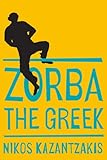 Zorba the Greek is a novel written by the Greek author Nikos Kazantzakis, first published in 1946. It is the tale of a young Greek intellectual who ventures to escape his bookish life with the aid ...
Zorba the Greek is a novel written by the Greek author Nikos Kazantzakis, first published in 1946. It is the tale of a young Greek intellectual who ventures to escape his bookish life with the aid ...
-
The Stranger by Albert Camus
 Since it was first published in English, in 1946, Albert Camus's extraordinary first novel, The Stranger (L'Etranger), has had a profound impact on millions of American readers. Through this story ...
Since it was first published in English, in 1946, Albert Camus's extraordinary first novel, The Stranger (L'Etranger), has had a profound impact on millions of American readers. Through this story ...
-
Complete Poems of Giacomo Leopardi by Giacomo Leopardi
 Giacomo Taldegardo Francesco di Sales Saverio Pietro Leopardi (June 29, 1798 – June 14, 1837) was an Italian poet, essayist, philosopher, and philologist.
Giacomo Taldegardo Francesco di Sales Saverio Pietro Leopardi (June 29, 1798 – June 14, 1837) was an Italian poet, essayist, philosopher, and philologist.
-
Independent People by Halldor Laxness
 Independent People is an epic novel by Nobel laureate Halldór Laxness, published in 1946. It deals with the struggle of poor Icelandic farmers in the early 20th century, only freed from debt bondag...
Independent People is an epic novel by Nobel laureate Halldór Laxness, published in 1946. It deals with the struggle of poor Icelandic farmers in the early 20th century, only freed from debt bondag...
-
1984 by George Orwell
 The story follows the life of one seemingly insignificant man, Winston Smith, a civil servant assigned the task of perpetuating the regime's propaganda by falsifying records and political literatur...
The story follows the life of one seemingly insignificant man, Winston Smith, a civil servant assigned the task of perpetuating the regime's propaganda by falsifying records and political literatur...
-
Memoirs of Hadrian by Marguerite Yourcenar
 Memoirs of Hadrian is a novel by the French writer Marguerite Yourcenar about the life and death of Roman Emperor Hadrian. The book was first published in France in French in 1951 as Mémoires d'Had...
Memoirs of Hadrian is a novel by the French writer Marguerite Yourcenar about the life and death of Roman Emperor Hadrian. The book was first published in France in French in 1951 as Mémoires d'Had...
-
Molloy by Samuel Beckett
-
Malone Dies by Samuel Beckett
 Malone Dies is a novel by Samuel Beckett. It was first published in 1951, in French, as Malone Meurt, and later translated into English by the author.
Malone Dies is a novel by Samuel Beckett. It was first published in 1951, in French, as Malone Meurt, and later translated into English by the author.
-
Invisible Man by Ralph Ellison
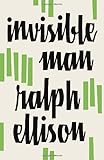 The novel addresses many of the social and intellectual issues facing African-Americans in the early twentieth century, including black nationalism, the relationship between black identity and Marx...
The novel addresses many of the social and intellectual issues facing African-Americans in the early twentieth century, including black nationalism, the relationship between black identity and Marx...
-
The Old Man and the Sea by Ernest Hemingway
 The Old Man and the Sea is one of Hemingway's most enduring works. Told in language of great simplicity and power, it is the story of an old Cuban fisherman, down on his luck, and his supreme ordea...
The Old Man and the Sea is one of Hemingway's most enduring works. Told in language of great simplicity and power, it is the story of an old Cuban fisherman, down on his luck, and his supreme ordea...
-
The Unnamable by Samuel Beckett
 The Unnamable is a 1953 novel by Samuel Beckett. It is the third and final entry in Beckett's "Trilogy" of novels, which begins with Molloy followed by Malone Dies. It was originally published in F...
The Unnamable is a 1953 novel by Samuel Beckett. It is the third and final entry in Beckett's "Trilogy" of novels, which begins with Molloy followed by Malone Dies. It was originally published in F...
-
Lolita by Vladimir Nabokov
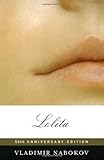 The book is internationally famous for its innovative style and infamous for its controversial subject: the protagonist and unreliable narrator, middle aged Humbert Humbert, becomes obsessed and se...
The book is internationally famous for its innovative style and infamous for its controversial subject: the protagonist and unreliable narrator, middle aged Humbert Humbert, becomes obsessed and se...
-
Pedro Paramo by Juan Rulfo
 Pedro Páramo is a short novel written by Juan Rulfo, originally published in 1955. In just the 23 FCE editions and reprintings, it had sold by November 1997 1,143,000 copies. Other editions in Mexi...
Pedro Páramo is a short novel written by Juan Rulfo, originally published in 1955. In just the 23 FCE editions and reprintings, it had sold by November 1997 1,143,000 copies. Other editions in Mexi...
-
The Devil to Pay in the Backlands by Joao Guimaraes Rosa
 Grande Sertão: Veredas (Portuguese for Big Backcountry: Tracks, English translation: The Devil to Pay in the Backlands) is an influential novel published in 1956 by the Brazilian writer João Guimar...
Grande Sertão: Veredas (Portuguese for Big Backcountry: Tracks, English translation: The Devil to Pay in the Backlands) is an influential novel published in 1956 by the Brazilian writer João Guimar...
-
Things Fall Apart by Chinua Achebe
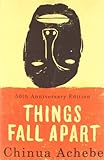 A novel of great power that turns the world upside down. The Nigerian novelist Achebe reached back to the early days of his people's encounter with colonialism, the 1890's, though the white man and...
A novel of great power that turns the world upside down. The Nigerian novelist Achebe reached back to the early days of his people's encounter with colonialism, the 1890's, though the white man and...
- Time
-
The Tin Drum by Günter Grass
 Acclaimed as the greatest German novel written since the end of World War II, The Tin Drum is the autobiography of thirty-year-old Oskar Matzerath, who has lived through the long Nazi nightmare and...
Acclaimed as the greatest German novel written since the end of World War II, The Tin Drum is the autobiography of thirty-year-old Oskar Matzerath, who has lived through the long Nazi nightmare and...
-
The Stories of Anton Chekhov by Anton Chekhov
 Anton Pavlovich Chekhov was a Russian short-story writer, playwright and physician, considered to be one of the greatest short-story writers in the history of world literature. His career as a dram...
Anton Pavlovich Chekhov was a Russian short-story writer, playwright and physician, considered to be one of the greatest short-story writers in the history of world literature. His career as a dram...
-
The Golden Notebook by Doris Lessing
 This book, as well as the couple that followed it, enters the realm of what Margaret Drabble in The Oxford Companion to English Literature has called Lessing's "inner space fiction", her work that ...
This book, as well as the couple that followed it, enters the realm of what Margaret Drabble in The Oxford Companion to English Literature has called Lessing's "inner space fiction", her work that ...
-
Season of Migration to the North by Al-Tayyib Salih
 Season of Migration to the North is a classic post-colonial Sudanese novel by the late novelist Al-Tayyib Salih. The novel charts individuation of the (un-named) narrator, who has returned to hi...
Season of Migration to the North is a classic post-colonial Sudanese novel by the late novelist Al-Tayyib Salih. The novel charts individuation of the (un-named) narrator, who has returned to hi...
-
One Hundred Years of Solitude by Gabriel Garcia Marquez
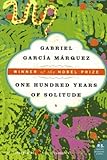 One of the 20th century's enduring works, One Hundred Years of Solitude is a widely beloved and acclaimed novel known throughout the world, and the ultimate achievement in a Nobel Prize–winning car...
One of the 20th century's enduring works, One Hundred Years of Solitude is a widely beloved and acclaimed novel known throughout the world, and the ultimate achievement in a Nobel Prize–winning car...
-
The Sound of the Mountain by Yasunari Kawabata
 The Sound of the Mountain (Yama no Oto) is a novel by Japanese writer Yasunari Kawabata, serialized between 1949 and 1954. Its translation into English by Edward G. Seidensticker was first publishe...
The Sound of the Mountain (Yama no Oto) is a novel by Japanese writer Yasunari Kawabata, serialized between 1949 and 1954. Its translation into English by Edward G. Seidensticker was first publishe...
-
The Complete Stories of Franz Kafka by Franz Kafka
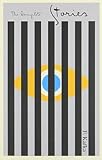 The Complete Stories of Franz Kafka is a compilation of all Kafka's short stories. With the exception of Kafka's three novels (The Trial, The Castle and Amerika), this collection includes all of Ka...
The Complete Stories of Franz Kafka is a compilation of all Kafka's short stories. With the exception of Kafka's three novels (The Trial, The Castle and Amerika), this collection includes all of Ka...
-
History by Elsa Morante
 History: A Novel is a novel by Italian author Elsa Morante, largely seen to be her most famous and controversial work. Published in 1974, it narrates the story of a woman, Ida Ramundo, and her two ...
History: A Novel is a novel by Italian author Elsa Morante, largely seen to be her most famous and controversial work. Published in 1974, it narrates the story of a woman, Ida Ramundo, and her two ...
-
The Complete Tales of Edgar Allan Poe by Edgar Allan Poe
 Edgar Allan Poe (January 19, 1809 – October 7, 1849) was an American writer, poet, editor and literary critic, considered part of the American Romantic Movement. Best known for his tales of mystery...
Edgar Allan Poe (January 19, 1809 – October 7, 1849) was an American writer, poet, editor and literary critic, considered part of the American Romantic Movement. Best known for his tales of mystery...
-
Midnight's Children by Salman Rushdie
 Midnight's Children is a loose allegory for events in India both before and, primarily, after the independence and partition of India, which took place at midnight on 15 August 1947. The protagonis...
Midnight's Children is a loose allegory for events in India both before and, primarily, after the independence and partition of India, which took place at midnight on 15 August 1947. The protagonis...
-
The Book of Disquiet by Fernando Pessoa
 The Book Of Disquietude or The Book of Disquiet (Livro do Desassossego in Portuguese), published posthumously, is one of the greatest works by Fernando Pessoa. It is signed under the semi-heteronym...
The Book Of Disquietude or The Book of Disquiet (Livro do Desassossego in Portuguese), published posthumously, is one of the greatest works by Fernando Pessoa. It is signed under the semi-heteronym...
-
Beloved by Toni Morrison
 Beloved (1987) is a Pulitzer Prize-winning novel by Nobel laureate Toni Morrison. The novel, her fifth, is loosely based on the life and legal case of the slave Margaret Garner, about whom Morrison...
Beloved (1987) is a Pulitzer Prize-winning novel by Nobel laureate Toni Morrison. The novel, her fifth, is loosely based on the life and legal case of the slave Margaret Garner, about whom Morrison...
-
Blindness by Jose Saramago
 Blindness is a novel by Portuguese author José Saramago. Blindness is the story of an unexplained mass epidemic of blindness afflicting nearly everyone in an unnamed city, and the social breakdo...
Blindness is a novel by Portuguese author José Saramago. Blindness is the story of an unexplained mass epidemic of blindness afflicting nearly everyone in an unnamed city, and the social breakdo...
-
Poems by Paul Celan
 One of the greatest poets to ever write in German and among the most indispensable writers of the twentieth century in any language, Paul Celan's poems "embody a conviction that the truth of what h...
One of the greatest poets to ever write in German and among the most indispensable writers of the twentieth century in any language, Paul Celan's poems "embody a conviction that the truth of what h...

No comments:
Post a Comment